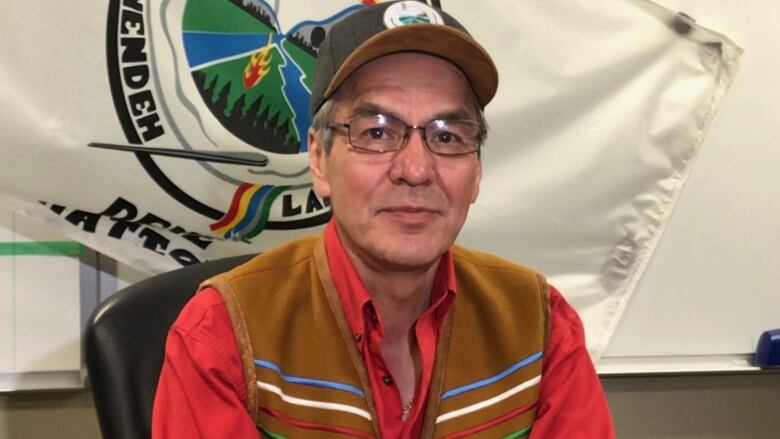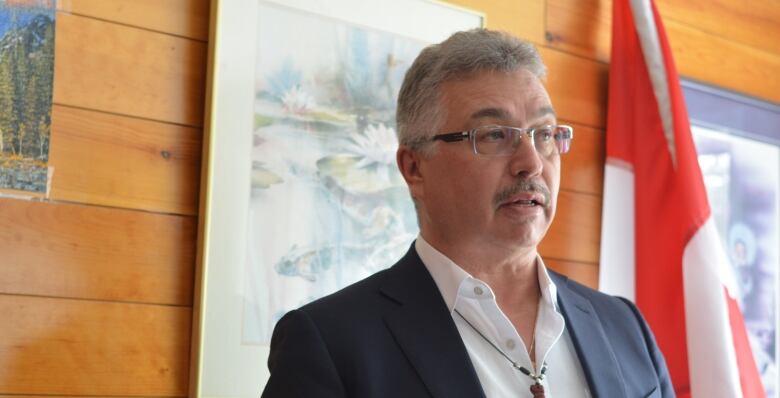'Enough talk, let's see some action': Dene Nation on MMIWG
Dene Nation Chief Norman Yakeleya wants swift action MMIWG report

Dene National Chief Norman Yakeleya wants Canadian and Indigenous governments to take swift action on the 231 calls to justice contained in the MMIWG final report.
"We've got to hold their feet to the fire, and we've got to do it in a way that gives satisfaction to the families of these beautiful people who have gone missing. So enough talk let's see some action," he said.
The report calls on all governments to form a national action plan to address human rights abuses and violations. It says the Canadian state "committed and condoned" abuses that amount to genocide against Indigenous women, girls, and 2SLGBTQ people.
Accountability is paramount,Yakeleyasaid.
"How are they going to ensure these recommendations are not like the [Royal Commission on Aboriginal Peoples], where they sit. I want these recommendations to be acted on what they plan to do, and how we're going to hold them accountable through a measurable system that we can say after one year, 'This is what you've done.'"
Yakeleya said theplight of murdered or missing Indigenous women and girls is personal for him and many families in the North.
"I'm deeply impacted by my family also being in this report. My mother's older sister was murdered in Edmonton and also, my cousin's daughter in Yellowknife. We have families that, in the Northwest Territories, have also been impacted," he said.
The Dene Nation will next sort through the report, which is more than 1,000 pages long, and pick out their priorities. Dene leaders still have to meet and discuss the report and its 231 calls for justice, he said.
Yakeleya said there must be tough questions directed at candidates in the upcoming federal and territorial elections and for Dene leaders about how they too plan to respond to the report.
"While nothing can be replaced the people that we have lost we can build on the legacy of the situation we encounter by improving the system and the relationship," he said.
Liberal MP affirms MMIWG report's finding of genocide

Speaking at a press conference Friday, Liberal MP Michael McLeod agreed with the report's finding of genocide.
"You have to admit that it is a genocide. When you're removing people's culture, removing their language, you're forcing assimilation, I think you would have to term it genocide," he said.
McLeod points to the Indian Act, residential schools, forced sterilization and other state policies affecting Indigenous people.
When asked whether all the recommendations should be adopted, McLeod said the government is reviewing the report. He said he needs more time to consider the efficacy of each one before he gives his opinion.
"I've known all my life that the Indigenous women across the country, including the Northwest Territories, have really difficult times, even in our small communities, with the treatment that they get by other cultures and, not only other cultures, but by our own cultures, too," McLeod said.
"If the recommendations are gonna change that, I certainly support it," he said.
231 Calls for Justice
Some of the reports 231 Calls for Justiceinclude:
-
Provide safe and affordable transportation infrastructure for remote and rural communities and special accommodations for fly-in, northern and remote communities.
-
Fund policing services within Indigenous communities to meet their safety and justice needs.
-
Study the relationship between development projects and violence against Indigenous, women, girls and 2SLGBTQ people.
-
Establish a national Indigenous and human rights ombudsperson to field complaints about Indigenous and human rights violations.
-
Ensure that Indigenous peoplehave access to safe housing, clean drinking water, and adequate food.
-
Conduct a federal review and amend the Criminal Code to eliminate definitions of offences that minimize the culpability of the offender.
-
Fund Indigenous police services equitably to non-Indigenous policing services.
-
Consider violence against Indigenous women, girls, and 2SLGBTQ people as an aggravating factor at sentencing, andamend the Criminal Code accordingly. Include cases where there is a pattern of intimate partner violence and abuse as murder in the first degree under section 222 of the Criminal Code.
-
Evaluate impacts of Gladue principles and section 718.2(e) of the Criminal Code on sentencing equity as it relates to violence against Indigenous women, girls, and 2SLGBTQpeople.












_(720p).jpg)


 OFFICIAL HD MUSIC VIDEO.jpg)
.jpg)



























































































